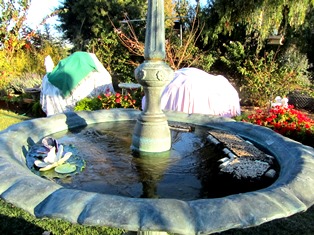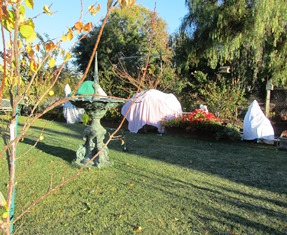The Quiet Beauty of a Winter Garden
There is a quiet beauty in a winter garden. You must endure cold to appreciate it. On my farmette, there’s also fog and wind and misty rain. But as you gaze in mindfulness, the rewards come.
When trees are bare, you can appreciate the beauty of their scaffolding, branching habits, and fruiting spurs. There is an attractiveness about tree bark that is rough or smooth and colored in earthy hues of green, gray, or reddish brown. Bare trunks and branches provide visual interest until blossoms and blooms break in spring.
With pruning done and leaves removed, the roses rest. Birds gather at feeders and frolic in the fountains. Beneath the soft, damp earth, roots are taking in nutrients to prepare the fruit trees for a surge of growth when warmer days arrive.
The garden is a place to conjure memories and ponder life and destiny. Goethe, the German playwright, poet, and novelist wrote that “Sometimes our fate resembles a fruit tree in winter. Who would think that those branches would turn green again and blossom, but we hope it, we know it.”
Winter is the perfect time to contemplate the tap root of your being and to think and and dream and plan for what will blossom in your life when warmth and light returns. French philosopher and author Alfred Camus wrote, “In the depths of winter, I finally learned that within me there lay an invincible summer.”
I have a simple ritual of visiting my winter garden. I prepare a cup of hot water with juice of half a lemon and a tablespoon of honey or sometimes just a cup of coffee or tea. Then with cup in hand, off I go to inspect the fruit trees, the bare grape and berry vines, and the soil turned in raised boxes waiting to receive kitchen herbs. This ritual inspires me and silently powers me up with hope and energy.
Perhaps you have a similar winter ritual. If not, consider checking out my newest nonfiction book, RITUALS FOR LIFE and plant something in the earth or the garden of your psyche that holds the promise of bearing fruit in its own perfect time. Now is the time to greet each new winter day for the blessings it brings and appreciate the stark beauty of Nature.

More than 150 rituals for sound mind, strong body, and meaningful connections to the people around you
Plunging Temperatures–The Perfect Time to Bring Out the Honey
Cold and flu season is upon us. Here in Northern California, temps are plunging into the 20s and 30s and snow may be on its way. It is important to have a strong immune system to fight off these winter maladies.

A frozen sheet of ice blocks the cork (permitting honeybees to drink) from moving in our backyard fountain
I’m taking down another jar of honey from the shelf where I stacked the jars over the summer. One teaspoon of raw buckwheat honey taken daily has been recommended by doctors as a powerful booster for the immune system. See http://www.prweb.com/releases/honey/buckwheat-honey-raw/prweb10242276.htm.
With the weather change comes the cold and flu season, so I shouldn’t have been surprised that my husband came home from work yesterday feeling out of sorts. Our neighbors have all been sick with colds and he’s concerned that he might have caught the bug.
I made him a cup of hot ginger tea, sweetened with raw honey. Honey can be consumed directly from the spoon or in hot water or in a tea or infusion with lemon.
I became a believer in honey and ginger tea years ago while studying Tai Chi. My 84-year-old teacher swore by drinking hot tea made by steeping an inch or two of fresh, peeled ginger and adding lemon and honey. Her stamina was nothing short of remarkable–she not only did Tai Chi, but sang opera, painted Chinese brush paintings, and taught many classes on herbs, reflexology, and other aspects of health and fitness in California and Hawaii.

Using sheets and blankets, we’ve covered the citrus trees around our farmette as temps are expected to plunge into the 20s tonight
Holistic practitioners have long espoused belief in the healthful benefits of raw honey. Honey was used by the ancient Greeks and Romans for a variety of maladies. Modern medical doctors and researchers have extolled honey’s antiseptic, antibacterial, and anti-inflammatory properties, and many cold and flu preparations contain honey as an ingredient. It a cost-effective way to treat a cough. See http://www.mayoclinic.com/health/honey/AN01799
Honey is the only food on the planet that does not go bad. It may crystallize, but it never becomes sugar. Crystallized honey in a jar can be returned to liquid by removing the lid and setting the jar in warm water. Never heat honey in the microwave or boil it because it will destroy the natural enzymes. And never give honey to a child under the age of one year because of the risk of their developing botulism.
You don’t have to wait to start gaining the benefit of raw honey. You can strengthen your immune system now before the dreaded cold and flu sweeps through your neighborhood. Daily consumption of a teaspoon of raw honey (from flower-fed bees) that has been minimally filtered can be good for your health and, especially, your immune system.
 Facebook
Facebook Goodreads
Goodreads LinkedIn
LinkedIn Meera Lester
Meera Lester Twitter
Twitter



